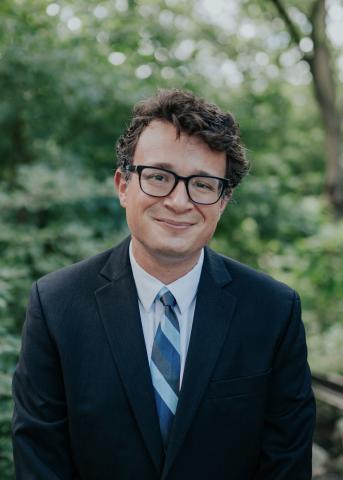November 27, 2023
By Ella Loveland, Student Life
Born with significant hearing loss in his right ear, Jacob Lowy spent most of his life without any accommodations.
This was, in some ways, by choice. However, for a long time, Lowy felt he had to choose from an either-or set of options: either he get a hearing aid and risk needing to consistently overcome societal perceptions of his capabilities, or he could blend in.
He chose the latter, until the University of Michigan’s Services for Students with Disabilities (SSD) introduced him to accommodations he was unaware even existed. A newly-launched fund will give more U-M students like Lowy greater access to academic-equalizing accommodations that may have been previously unknown or felt out of reach.
When Lowy was young, his family was urged not to pursue testing or accommodations for his hearing loss. This, Lowy presumes, was to spare his school administration from the burden of additional paperwork.
Although the University of Michigan Medical School alumnus (MD, ’23) managed through much of his life without accommodations, medical school posed an entirely different challenge, with stakes that were too high to risk.
"As I started shadowing physicians in the operating room during medical school at U-M, I realized that it was really hard for me to hear people while they were wearing masks, so I decided to have my hearing reevaluated," Lowy explained.
Lowy reached out to Services for Students with Disabilities (SSD) and was presented with a range of accommodation options tailored to his needs, helping him fulfill his dream of becoming a doctor.
Student Accessibility and Accommodation Services (SAAS), a unit within Student Life that now houses SSD, recently launched the Removing Barriers, Providing Access: Neuropsych Testing and Clinical Evaluations Fund. Some accommodations first require students to get specific evaluations and testing, with costs that can easily exceed a college student’s budget. SAAS’s new fund helps alleviate cost concerns so students can focus on excelling inside and outside the classroom.
Created in 2021, SAAS unites four key resources: SSD, the U-M Adaptive Sports & Fitness Program, Academic Support and Access Partnerships, and the Testing Accommodation Centers. Across campus, SAAS is helping create an inclusive and equitable environment for disabled students, which includes removing barriers to resources.
“Neuropsych testing and other forms of clinical evaluations can be rather expensive and present an additional burden for many college students,” said Dr. Feranmi Okanlami, director of SAAS. “This fund will allow us to help more students access the resources they need to receive the accommodations necessary for their academic experience.”
Delayed diagnosis of a disability can affect students’ academic success and overall well-being. Many students lack resources to afford testing and evaluations, and long wait times for free or reduced-price assessments hinder their access to accommodations.
“I have been waiting for ADHD testing for one year and am still on a waitlist,” shared Jess Wang, a second-year student in the College of Literature, Science and the Arts at U-M. “As a college student, I can’t afford ADHD testing outside of U-M.”
During their first semester at U-M, Wang began to notice symptoms of ADHD, such as difficulty focusing in noisy settings and over lengthy time periods. Currently on the waitlist for ADHD testing, Jess praises SSD for their support and providing accommodations throughout the process.
“I am less stressed about timed exams and am able to focus on my academics more,” said Wang. “This experience makes me feel like everyone here is trying to help me and listens to my voice.”
The financial support of this fund grants a larger number of students the opportunity to access accommodations, impacting not only their academic experience but their life, similar to the profound effect that Lowy's accommodations had on him.
For Lowy, accommodations included computer-aided real-time translation for lectures, extra time during clinical evaluations, an augmented stethoscope to hear heart and lung sounds and assistance with coordinating clinical rotations to ensure that professors and peers were informed about his hearing loss ahead of time.
These accommodations made a significant difference, ensuring a level playing field between Lowy and his peers.
Lowy encourages other students with disabilities to embrace the support U-M offers. "I found it to be an incredibly supportive environment. I wouldn't have even known what an accommodation for me would look like before SSD," shared Lowy.
Since 2021, the University of Michigan Medical School has implemented additional programming that specifically supports medical students' accommodation needs. These include no wait confidential consultations to discuss possible accommodations, access to neuropsychological testing, assistance navigating didactic and clinical courses and faculty accommodation support. The Medical School and SAAS work together to provide support to students with disabilities or suspected disabilities, and this new fund will be available to all U-M students at any one of the three campuses that is connected to their disability services office.
Lowy and Wang's journeys are a testament to the importance of cultivating a culture of support and accommodation for individuals with disabilities. Lowy’s experience not only allowed him to pursue his dream of becoming a doctor, but also inspired him to advocate for others facing similar challenges.
"What others need to know is that living with a disability is a challenging experience because you often try to navigate daily life without making excuses,” said Lowy. “Having someone else in your corner to support you allows you to thrive and excel in a way that benefits everyone."
By supporting SAAS, individuals can contribute to bridging the gap for students with disabilities at the University of Michigan. Together, it is possible to create a more inclusive and equitable educational experience for all.
“As a first generation student, I didn’t know who or where to seek help from,” shared Wang. “U-M and SSD have helped me to break the barriers and do my best in college. I wouldn’t have become who I am without the help I received from SSD.”

